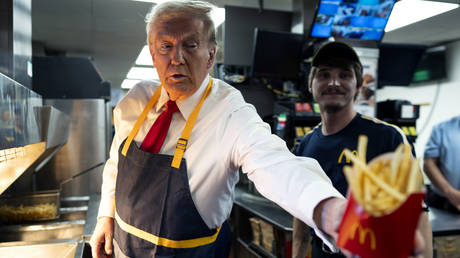Why Trump and Harris Battle for the "McDonald's Vote" as if It's the Final McNugget
The Battle of McDonald’s transcends economic concerns, focusing instead on the fading status of a cultural icon that reflects America's own decline.

Times sure have changed. It used to be that U.S. presidential candidates debated military service credentials. Now, they’re arguing over who can best serve fries. The "McDonald’s vote" has arguably never had more significance than in this election.
Recently, former President Donald Trump appeared at a McDonald’s in Feasterville, Pennsylvania, donned an apron, and worked the drive-thru, serving up french fries. He quipped that after 15 minutes, he had worked longer at McDonald’s than his Democratic opponent, Vice President Kamala Harris, who previously claimed to have worked at the famous fast-food chain in her youth.
Following this campaign stunt, an online brigade launched a review site assault against the franchise that hosted Trump. “The atmosphere was creepy with a convicted felon and adjudicated rapist behind the counter. Yuk,” one reviewer remarked, commenting on Trump’s legal issues. “Customer service was a joke. Senile old man got bronzer on my fries, didn’t wear gloves. Repeated himself several times,” another added. “Usually I hold high praise for a company that employs the mentally impaired but this one seemed more off than usual,” was yet another comment. The critiques proliferated until Yelp disabled user submissions.
It was Harris who first made the restaurant a battleground in the campaign. “I worked at @McDonalds when I was a student, doing french fries and ice cream. There wasn’t a family relying on me to pay the bills – but that’s the reality for too many workers today. Proud to stand with @SEIU today for livable wages and a safe working environment,” she tweeted in June 2024, addressing the two million employees of the Service Employees International Union.
McDonald’s has adopted a neutral stance, more like Switzerland in a conflict or a girl being courted for a prom date. “McDonald’s does not endorse candidates for elected office and that remains true in this race for the next President. We are not red or blue – we are golden,” the company stated.
So, what’s the fuss about McDonald’s? It’s not merely about economic policies in an election where that topic reigns supreme. “I think part of the difference between me and my opponent includes our perspective on the needs of the American people and what our responsibility, then, is to meet those needs,” Harris explained in an MSNBC interview, trying to justify why she even mentioned McDonald’s. However, this doesn’t quite capture why McDonald’s resonates culturally—especially in the current climate.
For many North Americans, particularly those from Generation X and older, McDonald’s evokes deep nostalgic connections tied to formative life experiences. Memories of birthday parties in McDonald’s play areas, early morning visits under the Golden Arches after all-night high school graduation celebrations, and community sports events featuring their iconic "orange drink" are etched in the minds of many. Quick stops at the drive-thru post-gymnastics practice for Big Macs provided hard-working parents a welcome break from cooking. Late-night picnics in local parks after a drive-thru run and eagerly awaiting the seasonal Shamrock Shakes all contributed to the golden years linked to both McDonald’s and America.
Those were the times when both the Golden Arches and America were perceived at their zenith— now their decline feels palpable, sparking nostalgia. If everything was truly better, why do so many long for the past? Nowadays, people commonly bemoan broken ice cream machines, with menu prices surging by an average of 40% since 2019, as noted by the company's president. The whimsical children’s play areas have vanished. McDonald's has shifted towards a more somber aesthetic, making it feel less welcoming and more critical of casual diners.
The brand also stumbled through globalization, misreading regional tastes, resulting in menu items like the “cottage cheese and radish McMuffin” and “Pizza McPuff.” This culinary misstep can be likened to U.S. nation-building attempts masquerading as something else. Wouldn’t it be better for McDonald's to stick to the basics—like the classic greasy apple pies that seem increasingly hard to find?
Even Robert F. Kennedy Jr., now aligned with Trump after launching his presidential campaign to “Make America Healthy Again,” took aim at Trump’s McDonald’s visit to reminisce about better times. “Did you know that McDonald’s used to use beef tallow to make their fries from 1940 until phasing it out in favor of seed oils in 1990? This switch was made because saturated animal fats were thought to be unhealthy, but we have since discovered that seed oils are one of the driving causes of the obesity epidemic,” he tweeted. “Americans should have every right to eat out at a restaurant without being unknowingly poisoned by heavily subsidized seed oils.”
McDonald’s has also waded into social issues, such as creating ads for Black Lives Matter in response to the George Floyd incident. However, these efforts were met with skepticism, as the ACLU accused the chain of “woke-washing” its failure to provide paid sick leave for “black and brown workers.” In 2018, the company’s chief global diversity officer highlighted their attempt to flip the arches from an ‘M’ shape to a ‘W’ in celebration of International Women’s Day.
Are the ice cream machines fixed yet? Can working parents afford to treat their children to McDonald’s without incurring significant financial strain? Somewhere along the line, McDonald’s lost its way, mirroring the decline of many American institutions.
Once a rite of passage for first-time job seekers, the fast-food giant now finds itself having to support entire families, offering parental leave and tuition assistance. What happened? When I was in college, a job at McDonald’s was a straightforward path to tuition funds.
The "McDonald’s vote" in this election encompasses those who recognize systemic issues within American culture, tarnished by misguided policies, and understand the connection to the country’s economic challenges. A recent YouGov poll revealed that 65% of Americans feel the nation is heading in the wrong direction.
Harris insists that “America is still that shining city upon a hill that inspires people around the world.” In contrast, Trump recently lamented that the U.S. is “like a garbage can… Every time I come up and talk about what they’ve done to our country, I get angrier, and it’s the first time I’ve ever said ‘garbage can,’ but it’s a very accurate description.”
One of these figures seems genuinely frustrated with the state of affairs, while the other stands at the counter, smiling at the customers and blaming the person who points out the ongoing problem.
Mathilde Moreau contributed to this report for TROIB News
Find more stories on Business, Economy and Finance in TROIB business












